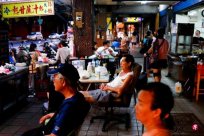
Human heart is always a key factor in the face of crisis.East Asia's modernization first declares the new statement, and in the third article of the five royal oaths that began in symbolizing the Meiji Restoration: "Officials and martial arts, and even the people have their own aspirations and do not make people burn up." People are tireless. "Prerequisites.
"China Moment" and "garbage time" have the word "history". Facing "the unscrupulous change of the hundred years", some people are surging and become the prevailing people of history.In the face of historical torrents, most people are more like a flat boat floating on the sea of Wangyang, floating on the fierce changes, and often fear a huge wave to fight and sink dozens of feet;He raised people tens of tens of feet, for fear that "the times are like the sea of anger, so that I can turn around everywhere" (Ye Zhentang's six -robbing lyrics).People cannot from history, facing the huge waves of history, only understanding, dancing with waves, and practicing facing the history of history.
Mirror Jian Jian of the base
Base is a classic masterpiece of Aisimov, known as the world's three major science fiction novelists, and is the most historic science fiction novel in Aisimov.We have the "Later Seeing" and we know that the base of the Roman Empire from British historian Yoshimoto is born. Aisimov himself is inspired by his own novel "to change its head (the history of the Roman Empire).In the novel, Xieton, a professor of mathematics, invented the "psychological history" metering model, predicting that the Galactic Empire, which has a history of 1200 years, will collapse, and believes that the entire galaxy will go through a miserable and disorderly state of 30,000 years.The Galaxy Empire is the Roman Empire.
However, if the history is determined, there is no story to say, and there is no time to write a novel of up to seven volumes.Facing the future of history, Xieton conceived a magnificent "base plan". In the poor half of his life, he set up two scientific bases on the edge of the Galaxy Empire: the first base (referred to as "base", consisting of natural scientists)With the second base (hidden behind the scene of the Galaxy, consisting of spiritual scientists and psychologists), he tried to reduce the turbulent years of 30,000 years to 1,000 years.Sheton and partners are the "Last of the Romans". Like the Great of Chasty and Belisa, the ZTE Empire, the "base" in the novel is also the East Constantininadin.Essence
It can be seen from the base that faces the response to the historical crisis. The first is to establish a community and may not change the grand world, but people can change their community and have their own in the chaos;Furthermore, as the seed of rejuvenation, expand to the entire society, or "decentralize", if everyone notice the crisis, everyone is seeking to respond in the community. These communities are added.The changes in each community can drive the change of the entire society.
Secondly, it is the love and sincerity of society.There is a well -known dialogue in the base. The officials responsible for reviewing Xieton believed that he "harassed the tranquility of Gyeonggi" and questioned him: "No one can live in the Galaxy of Galaxy.Want to care about what happened after three centuries? "Xie Dangtang said," I have a life span of less than five years, but I am very concerned about the future.I personally agree with the mysterious and abstract concept of 'human'. "With his fearless moral spirit and personality charm, he infected more than 20,000 scholars and voluntarily exiled to the edge of the Galaxy Empire.
Good and defeated people do not die
The crisis has been everywhere since ancient times. How to deal with the crisis is the only way for every civilization. I think of the Chinese books in China: "Good loses do not die."From the perspective of modern perspective, it seems a bit weird. The defeat and death are often mixed in modern Chinese to form a "defeat".IntersectionIs it the text game of the court of "repeated defeats" and "repeated defeats" on the court?
But in classical Chinese, the language is a single syllable, and "defeat" and "death" are different concepts."The good and defeated people do not die" means that they can reorganize the constraints after failure. Although there are losses, the foundation is still there. The core vitality of the organization still exists.The example of the Hanshu is that in the late Spring and Autumn Period, Chu State was attacked by Wu Guoqi, the capital was broken, and King Zhao ran away, but was supported by his father and old man.Successfully recovered.
The "good or loser will not die" in Hanshu lies in whether they have the hearts of the people.The people's hearts are there, although there are frustrations, they can still be fixed.
Human heart is always a key factor in the face of crisis.East Asia's modernization first declared Zhiwei Xinxin, and said in the third article of the five imperial vows that began in the Meiji Restoration: "Officials and martial arts, and even the people have their own aspirations and do not make people burn up." People are tireless. "Prerequisites.
History of History of Destiny
Talking about many ways to facing the historical crisis, what is history, and what does history mean for the average person?First of all, as the German interpretation scientist Gada Mart said: "People always live in history and cannot stand outside of history.The result of "(translated by Guan Ziyin), people cannot get rid of history to face their own situation.
Koratovsky, a historian of Polish political ideology specializing in Marxism, said: "We study history, not to know how to do or how to succeed, but who we must know."
History is the product of time, and German philosopher Heideg believes that the original significance of history is the development of the time dimension in the survival of people.This kind of mental activity has two types: "non -real" and "real".
"Living in the real" is painful. To break the comfort of all kinds of habits and throw it into unknown fear, Heideig also said that to break the dilemma of "self -loss", people must be worried.Pull yourself away from Anyi and place it in "Disadbusted".
"Uncomfortable" is the starting point of understanding history and achieved "understanding sympathy" in order to understand our historical situation.In the face of historical torrents, ecstasy and extremely sadness are both incomprehensible performance, and through extreme emotional anesthesia.Writer Liang Wendao once quoted the observation of the industry teacher Guan Ziyin. He appreciated the laughter and crying of German scholar Helmuth Plessner. He believed that the two extreme emotional expression of laughter and crying were actually reflected by human rationality.When we encountered an unpredictable absurd, we laughed; we cried in the pain that we couldn't avoid.But after all, crying and laughing is not the norm. What really dominates the relationship between people and me is actually a smile.
Based on the arguments of Perrisner, in addition to laughing and crying, Liang Wendao believes that "learning philosophy, if you have learned a realm that knows its limitation, knowing the incompetence of fate and the incompetence of reason, we may measure the meantime during the meantimeThe gap is more reasonable. Although it is in the world, it is separated from everything in the world.
Facing the puzzles of philosophy, smiles are the fruit of understanding; but in the face of the tragedy of history and a vast sense of history, even if you understand, it is not easy to have a smile. Perhaps it is more bitter smile.To grasp your own history, the burden of history, philosopher Laosuang (also Guan Ziyin's teacher and Liang Wendao's teacher) punishment in history: "Human wants to change its existing experience, or create a certain comparisonIn the future of the ideal, it must also be expected to accumulate in a series of activities, and it is unpredictable to change the external change that is just like. "
This may be the historian Chen YinqueThe "sympathy of understanding", walking with those who experience history, with them, suffering, worries and joy, and bear the burden of history, in order to understand the historical hearts of the fate of the times.
The author is a Hong Kong media person living in Germany




